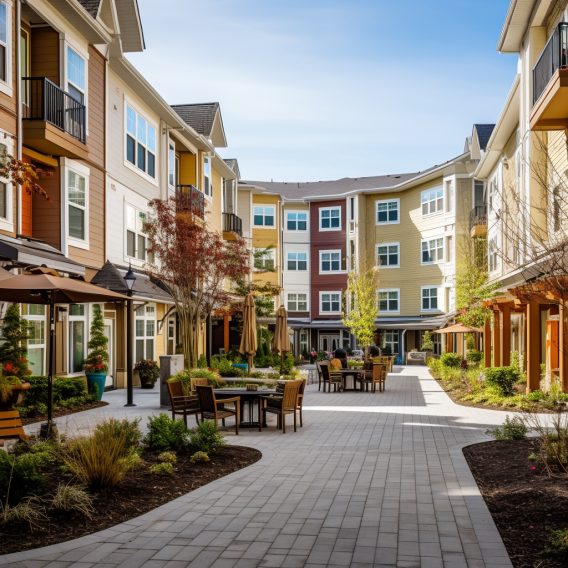As people age, their living situations often change to accommodate their evolving needs, preferences, and health conditions. Choosing the right senior living option can be a challenging and emotional decision for both seniors and their families. The variety of senior living options available today can be overwhelming, and it’s essential to understand the differences between them to make an informed choice. In this comprehensive guide, we will explore various senior living options, comparing their features, costs, and benefits. By the end of this article, you should have a clearer understanding of the options available and be better equipped to make the right choice for yourself or your loved one.
The aging population in the United States and many other countries is increasing significantly. According to the U.S. Census Bureau, the number of people aged 65 and older is projected to nearly double by 2050, reaching over 83 million. With this demographic shift, there is an increasing demand for senior housing options that can cater to the diverse needs and preferences of older adults.
Choosing the right senior living option is a decision that depends on several factors, including health, financial resources, social preferences, and lifestyle. It is essential to evaluate the various choices available and consider how well they align with an individual’s unique circumstances.
This article will explore and compare several senior living options, including independent living, assisted living, memory care, skilled nursing facilities, and continuing care retirement communities. We will delve into the features, costs, and benefits of each to help you or your loved one make an informed decision about the next chapter of life.
Independent Living
Independent living communities are designed for active and self-sufficient seniors who want to downsize and simplify their lives while enjoying a supportive and maintenance-free environment. These communities offer a range of amenities and services to enhance the quality of life for their residents.
Features:
- Private apartments or cottages
- Common areas for socializing and recreation
- On-site dining options
- Housekeeping and maintenance services
- Planned activities and outings
- Fitness centers
- Transportation services
- Safety features like emergency call systems
- Age-restricted or age-targeted communities
Costs:
The costs of independent living can vary widely depending on location, amenities, and the size of the living space. Monthly fees typically cover rent, utilities, and some services. Costs can range from $1,500 to $6,000 or more per month.
Benefits:
- Active and social environment
- Reduced home maintenance responsibilities
- Access to various amenities and services
- Community of peers in the same age group
Assisted Living
Assisted living facilities are an excellent choice for seniors who require assistance with activities of daily living (ADLs) but still want to maintain some independence. These communities offer a balance between support and autonomy, ensuring that residents receive the care they need.
Features:
- Private or semi-private apartments
- Personal care services (bathing, dressing, medication management)
- Three meals a day and snacks
- Housekeeping and laundry services
- Recreational and social activities
- 24/7 staff availability
- Assistance with mobility and transportation
- Safety features and emergency response systems
Costs:
The cost of assisted living can also vary based on location, the level of care required, and the size of the living space. On average, expect to pay between $3,000 and $7,000 per month.
Benefits:
- Assistance with ADLs
- Social interaction and recreational activities
- Safety and security
- Meals and housekeeping services
Memory Care
Memory care communities are specialized facilities designed to cater to individuals with Alzheimer’s disease or other forms of dementia. These communities provide a secure and supportive environment with trained staff who are experienced in dealing with memory-related issues.
Features:
- Specially designed living spaces to prevent wandering
- Structured routines and activities to support memory
- Trained staff to provide personalized care
- Secure and safe environment
- Medication management
- Specialized dining options
- Sensory stimulation and memory-enhancing programs
Costs:
Memory care costs are typically higher than those of assisted living due to the specialized care and services provided. Monthly fees can range from $4,000 to $8,000 or more.
Benefits:
- Specialized care for individuals with dementia
- Safe and secure environment
- Trained staff to manage behavioral and cognitive challenges
Skilled Nursing Facilities
Skilled nursing facilities (SNFs), often referred to as nursing homes, are designed for individuals who require round-the-clock medical care and support. These facilities are suitable for those recovering from surgery or illness, long-term care, or individuals with complex medical needs.
Features:
- Medical and nursing care provided 24/7
- Rehabilitation services (physical therapy, occupational therapy)
- Meals and dietary services
- Medication management
- Specialized care for complex medical conditions
- Semi-private or private rooms
- Social activities and recreational programs
Costs:
The cost of skilled nursing facilities can vary significantly based on the level of care required and the location. On average, you can expect to pay between $7,000 and $10,000 per month.
Benefits:
- 24/7 medical care and support
- Rehabilitation services
- Specialized care for complex medical conditions
- Meals and housekeeping services
Continuing Care Retirement Communities
Continuing Care Retirement Communities (CCRCs) offer a continuum of care, allowing residents to transition from independent living to higher levels of care as their needs change over time. These communities are designed to provide a lifelong housing solution.
Features:
- Independent living, assisted living, and skilled nursing on the same campus
- The ability to move between levels of care as needed
- Various amenities and services
- Social activities and programs
- Predictable and consistent costs
Costs:
The costs of CCRCs vary depending on the type of contract (life care, modified, or fee-for-service) and location. Entrance fees can range from $20,000 to $500,000 or more, along with monthly fees ranging from $2,000 to $6,000 or more.
Benefits:
- The ability to age in place
- Consistent community and social connections
- A comprehensive range of services
- Predictable costs for future care
Making the Right Choice
Choosing the right senior living option is a significant decision, and it’s essential to consider the following factors to make an informed choice:
- Healthcare Needs: Assess the current and potential future healthcare needs of the individual. Some options, like skilled nursing facilities and memory care, provide more specialized care for medical or cognitive conditions.
- Budget: Understand the financial resources available for senior housing. Different options have varying costs, and it’s crucial to choose one that aligns with the budget.
- Lifestyle Preferences: Consider the individual’s lifestyle and social preferences. Some seniors may prefer a more active and social environment, while others may seek a quieter and more independent setting.
- Location: Think about the location of the senior living community. Do you or your loved one want to stay close to family and friends, or are you open to relocating?
- Level of Independence: Assess the level of independence the individual desires. Independent living provides the most autonomy, while skilled nursing facilities offer the least.
- **Future Planning
**: Think about the long-term and evolving needs of the individual. Continuing care retirement communities are designed for those who want to plan for a lifelong housing solution.
- Consult with Professionals: Seek advice from healthcare professionals, social workers, and senior living experts to ensure you are making the best choice for your unique situation.
Conclusion
Choosing the right senior living option is a crucial decision that involves a careful evaluation of healthcare needs, budget, lifestyle preferences, and long-term planning. Whether it’s independent living, assisted living, memory care, skilled nursing facilities, or continuing care retirement communities, there are a variety of options available to cater to the diverse needs of seniors.
It’s important to conduct thorough research, visit potential communities, and consult with experts to make an informed choice that provides comfort, security, and the best quality of life for you or your loved one. Remember that every individual’s situation is unique, and there is no one-size-fits-all solution when it comes to senior living. With the right information and thoughtful consideration, you can find the perfect housing choice for your golden years.


